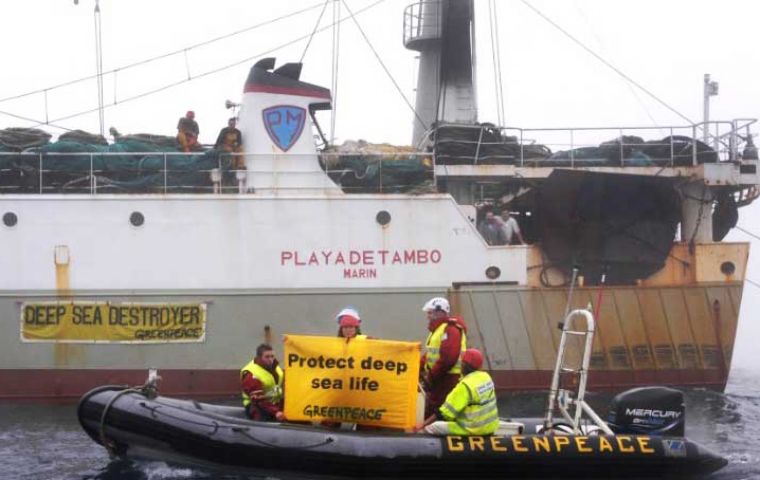MercoPress. South Atlantic News Agency
Greenpeace names twenty “monster vessels, the scourge of the oceans”
 Spain figures with five names, of which two are from Galicia,: Eirado do Costal, with home port in Cangas, and Playa de Tambo, based in Marin.
Spain figures with five names, of which two are from Galicia,: Eirado do Costal, with home port in Cangas, and Playa de Tambo, based in Marin. Five fishing vessels from Spain are among the 20 most destructive community fishing vessels in the European Union, according to a new report from the environmental organization Greenpeace. Out of the five, two are from Galicia,: Eirado do Costal, with home port in Cangas, and Playa de Tambo, based in Marin.
The other three vessels are from the Basque Country: Albacora Uno, Albatún Tres and Txori Argi.
With the release of the report, “Monster boats, The scourge of the oceans”, Greenpeace intends to warn on overfishing issues and protect the oceans through sustainable fishing. Greenpeace details that other ships belong to the following countries: Netherlands: 2; Portugal: 2; Sweden: 1; UK: 2; France: 1; Germany: 2; Denmark: 1; Lithuania: 2; Poland: 1 and Vanuatu, 1. The only vessel flagged outside the EU is operated by a Greek-registered company.
Greenpeace aim is that the publication of this report forces the vessels mentioned, will eventually withdraw from the oceans.
“European countries, particularly Spain, have a fishing capacity that is higher than that the oceans can tolerate, and the only solution is to reduce the fleet, so when the time comes to do so, we urge the governments to start with the most harmful boats as those in the list,” points out Marta Gonzalez, head of the Greenpeace’s Oceans campaign.
The publication of the list of vessels was criticized by the secretary general of the Spanish Fisheries Confederation (CEPESCA), Javier Garat, believing that the NGO launches baseless attacks to larger vessels that operate “legally”.
Garat insisted it is a distortion of facts that Spanish tuna boats that are contributing to the depletion of resources, because they are catching species “in good health, supported by scientific data.”
On the other hand, Nina Thuellen, EU fisheries project coordinator, stated: “A relatively small number of industrial fishing barons are recklessly making huge profits from our oceans, with little respect for environmental and social considerations. They use tricks – like changing the identity and flag of their vessels or using front companies and tax havens to increase their access to fishing grounds or, blatantly circumvent rules and regulations“.
For that reason, she urged Governments “must stop turning a blind eye to overfishing by taking action on monster boats and support low-impact fishers instead.”
For her part, Gonzalez stressed that ”it is time the Spanish Government took firm steps to comply with the Common Fisheries Policy (CFP)” and implement concrete measures to solve the overcapacity issue. (FIS).-




Top Comments
Disclaimer & comment rules-

-

-

Read all commentsI am surprised that the Russian 'Klondyke' monsters are not considered with their fleets of fishing boats, I remember them cleaning out whole seas. Perhaps a lot of smaller boats do less damage than one 'giant' - but I doubt
Nov 06th, 2014 - 11:56 am 0it!
Also I see that Chinese and Korean vessels are omitted - squid, whales can't be considered - perhaps because they are not fish?
I know shark are fish and are caught by their millions by the Chinese - perhaps they are omitted because only their fins are taken (low biomass).
No, not a convincing article.
We had one of these ships come to Australia. But the government effectively banned it with restrictive laws.
Nov 06th, 2014 - 12:10 pm 0The article is about fishing within the European Union. Let me get my thinking cap on and ponder why Russian, Chinese and Korean fishing vessels and practices are not mentioned. It's a real puzzle. I'll get back to you all when I've worked it out.
Nov 06th, 2014 - 01:28 pm 0In the meantime the sad truth is that even with these monster ships, mechanically powered and with modern sonar it still takes more man hours to catch a given mass of fish compared to the age of sail. That's how empty our oceans are now.
Commenting for this story is now closed.
If you have a Facebook account, become a fan and comment on our Facebook Page!